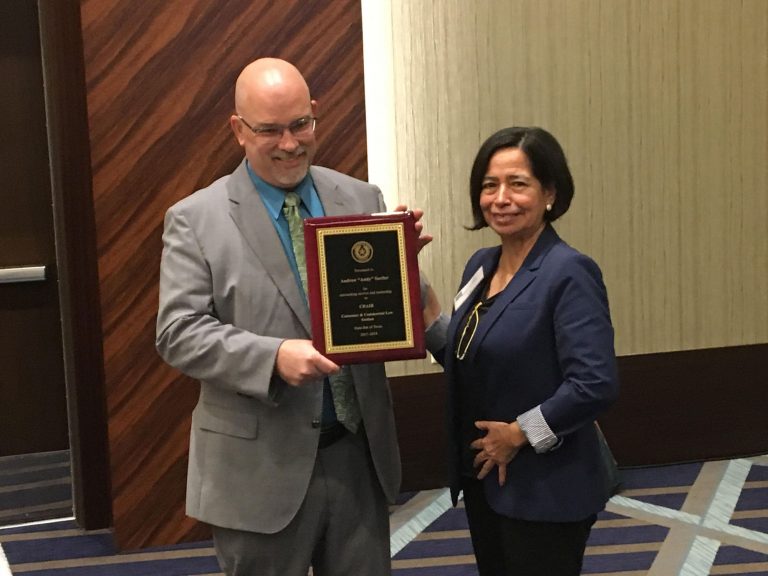Awards

Richard Alderman Award
Each year the Section presents the Richard Alderman Award for excellence in a CLE presentation to the speaker who earns the highest rating at the Section’s’Advanced Consumer and Commercial Law CLE.
The 2022 Richard Alderman Award for Excellence in a CLE presentation is awarded to Chad Baruch for his excellent presentation: Legal Writing – Effective Trial Motions at the 18th Annual Advanced Consumer & Commercial Law course.
Previous award winners include Raul Noriega, Jill Campbell, Manny Newburger, Jerry Jarzombek, and Richard Alderman.
Mark Kincaid Memorial Lecture
The Mark Kincaid Insurance Law Memorial Lecture is presented each year at the Section’s annual seminar as an enduring tribute to the late Mark Kincaid’s untiring advocacy on behalf of fairness and justice for all and to his legacy of dedicated service to family, community and the legal profession.
Mark was a Section member and officer who was known as “The Policyholder’s Lawyer.” He had established a reputation for crafting public policy for the protection of insurance policy holders who had minimal or no ability to prevent abuses in the claims process.
The Mark L. Kincaid Papers are part of the Texas Legislative Reference Library’s Deceptive Trade Practices Act Collection Legislative Archive. Spanning two decades, from 1995 through 2015, these documents reflect Mark’s efforts to address tort reform, to document the intent behind key legislation, and to monitor and influence changes to the Deceptive Trade Practices Act.
The inaugural Mark Kincaid Insurance Law Memorial Lecture was presented in 2019 at the Section’s 15th Annual Advanced Consumer & Commercial Law Seminar.
2023-24 Annual Craig Jordan Consumer Protection Writing Competition
The Consumer and Commercial Law Section of the Texas State Bar announces the Craig Jordan Consumer Protection Writing Competition for 2023-24. This competition was established to honor the life’s work of Craig Jordan, a section founder and nationally recognized and respected consumer protection attorney.
Most importantly, the contest serves to provide law students the opportunity to examine and offer perspectives on the multitude of challenges facing consumers and their advocates in an ever-changing marketplace and regulatory and legal environment.
The writer of the winning essay will receive a $ 4,000.00 cash award and the essay may be published in the nationally recognized Journal of Consumer & Commercial Law. The runner up will receive a $1,000.00 cash award. The first-place winner and runner up will also receive financial support to attend the annual Advanced Consumer and Commercial Law Seminar.
The deadline for submission of articles is 5 p.m. CDT June 6, 2024. Submit your entry using the form below. Read competition rules here.

Enter your writing competition submission
Competition Rules for the Craig Jordan Consumer Protection Writing Competition
Eligibility. Any student enrolled in an accredited Texas law school during the 2022-23 academic year is eligible to participate and may submit one legal essay for this competition.
Authorship. The author must research, write, and revise the paper for him or herself but may receive a reasonable amount of advice from professors, practitioners, and academicians. Each submission must have only one author.
Submission Deadline. Entries must be submitted no later than 5 p.m. CDT on June 6, 2024 via electronic mail directed to: JordanWriting22@gmail.com. The submission must be in WORD format in a single file. The time stamp of the submission is based on the receiver’s e-mail address and not the sender’s email address.
Judging. A panel appointed by the Council will judge the entries and all entries will be judged anonymously. Winners will be notified via email. All decisions of the panel are final.
Format. Submissions must be double-spaced, with twelve-point Times New Roman font and one-inch margins and must be in WORD format. The submission should conform to the most recent edition of The Bluebook: A Uniform System of Citation. The panel does not impose a length or minimum word requirement on submissions.
A cover page must be included with the submission. The cover page must contain only the following information:
- Title of Essay
- Author’s Name
- Author’s year in law school and expected graduation date
- Law school name and address
- Date article was submitted for academic credit, if so submitted
- Author’s mailing address and phone numbers
- Author’s e-mail address.
Topic. Applicants are invited to submit entries on the topic of their choice. Entrants may also select from one of the topics which will be posted at the Section’s website at its Jordan Competition 2023 announcement page.
The author’s name and law school must NOT appear anywhere in the essay other than on the cover page as described above. The Section will send all notices to the author’s e-mail address so if it changes after the date of submission of the entry, please provide an updated address.
Notice: Winners of the competition will be notified by email and an announcement will be posted at the Section’s website: txconsumerlawyers.org.
TOPICS FOR CRAIG JORDAN WRITING COMPETITION 2022
Papers submitted may be on the consumer topic of the writer’s choice. The following are suggestions only and selecting one does not increase your chances of winning the competition.
- Under state and federal law, what causes of action or remedies are available to a victim of synthetic identity theft? (Synthetic identity theft is a type of fraud in which a criminal combines real and fake information to create a new identity.)
- Ordinarily in the context of a real estate sale contract, when false and fraudulent representations are made about the subject matter of a contract but the person to whom they are made conducts an independent investigation into the matters covered by the representations and, before closing discovers the representations’ falsity, the causation and reliance elements of the Deceptive Trade Practices Act and fraud claims are negated. See Williams v. Dardenne, 345 S.W.3d 118, 125 & n.4 (Tex. App.—Houston [1st Dist.] 2011, pet. denied). In today’s seller’s market some buyers purchase property sight unseen and even waive inspection to make their offer attractive to the seller. Under Texas law, what sort of trouble might be brewing for sellers and buyers? Does waiving inspection expose the parties to a greater litigation risk down the road?
- Pursuant to PROPERTY CODE §94.203, when a homeowner of a manufactured home is evicted from a manufactured housing park for failure to pay lot rent, often the park owner keeps the manufactured home. The homeowner who has paid off the home, or has significant equity in it, loses the home because s/he missed a few months of rent payments for the lot. In many instances this results in a windfall for the park owner because the park owner then rents out the home AND the lot to another tenant. Park owners defend this approach arguing that the house is “abandoned” under the Manufactured Housing Standards Act, TEX.OCC.CODE §1201.217. Homeowners typically don’t have the $ 3-4K it costs to move the house and some park owners prohibit the towing of the home off the lot contending that they have an eviction judgment for unpaid lot rent. Often the homeowner fails to pay this lot rent because of an emergency such as an on the job injury, loss of employment or death of a breadwinner.
Under Texas law, what remedies are available to these homeowners who own the home (or its value minus the lot rent owed) but are not permitted to recover it? If no (or inadequate) remedies exist, how could relevant laws be amended to protect the homeowner’s interests?
- Federal courts of appeal are split on the question of whether private student loans are dischargeable in bankruptcy. Discuss their competing perspectives and for those circuits which permit these discharges, under what circumstances are such loans dischargeable?